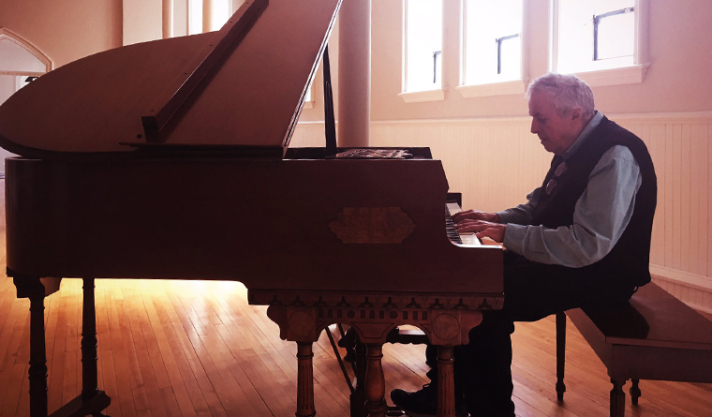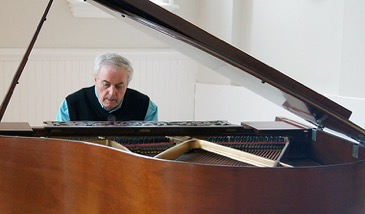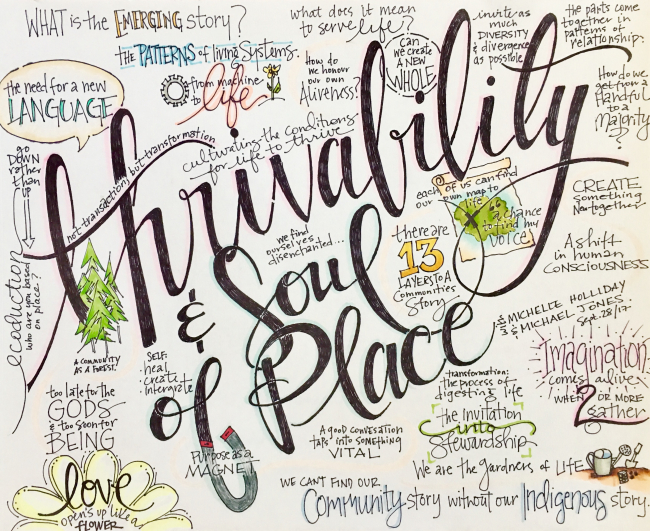
Award-winning pianist, author and community builder Michael Jones played as people gathered at The Resonance Centre for Social Evolution in Peterborough Sept. 28. Peter Pula of the Resonance Centre hosted the conversation on serving life and reawakening to place. Michael, along with Michelle Holliday, author of The Age of Thrivability, shared their experiences with cultivating community in the places where they live.
It can feel as if we have lost limbs and senses in today’s world of screen-based engagement and motor-based travel. To cope, we may shrink deeper and deeper inside ourselves, seeking to escape the shriek and the fumes and the emptiness around us. Others of us may do the opposite, throwing ourselves fully into an experience grated with fake lights, motor noises and the incessant cry to buy.
But some, a few, are quietly standing in the midst of the disturbing fray and gently inviting us to consider a different way.
|
Image

|
|
| Michael Jones playing in the auditorium at The Mount Community Centre in Peterborough Sept. 28. |
Michael Jones, a resident of Orillia, Ontario, is one of those who exudes a rare spirit. One gets the sense he has somehow been able to hold on to what many of us only dimly remember, and now he is trying to call us back.
Michael’s specific invitation is to reawaken to place as a community.
If we think long, most of us can probably remember a place that has “worked” on us, a place that, when we linger over our memories of it, nudges at the film of survival numbness that’s crept over our souls. Recalling and returning to those places as individuals can be powerful, healing and freeing experiences.
Michael also invites us as communities, as a collective, to “remember” the place where we live now.
“We have lost the power of story in a collective sense,” Michael says. “But it is the communities that know their story that can be regenerative.”
A small group from where Michael lives has been seeking to discover and understand their place and its story for years. One of the compelling stories of their place is that it is between biospheres. It is between the limestone plain and the warm, shallow pickerel lakes to the south and the deep granite and cold trout lakes of the pre-Cambrian shield to the north. Discovering this identity as an “in-between space” holds rich possibility for the story this community might intentionally live into in the future. As Michael notes, “It is at the intersection or edges where the richest exchanges and interactions take place.”
After listening to Michael share some of his thoughts with a small group at The Resonance Centre for Social Evolution in Peterborough Sept. 28, I felt an odd mix of homesickness and anxiety. Part of me wanted to book the next flight to the place that has played the greatest part in shaping my soul. Another part, though, wondered how I would cope with this fresh stirring to not settle for numbness.
|
Image

|
|
| Illustration by Jocasta Boone. Click to see a larger version. |
As I sit here, listening to Michael’s Almost Home album, I realize I have had the answer to that latter anxiety all along. It is in community that we (I) will be able to cope with all that arises as a result of intentionally awakening to place. Though there’s room for the individual and solitary experience, the essence of Michael’s invitation is that this is about a collective awakening.
“To be alive to place is to be alive to the love that binds our world, and our lives, together,” Michael writes in his book The Soul of Place. “This is the gift of place. In the turning to one another, we discover what it means to occupy our natural place in the world. It is our own way of looking at things. When we allow place to live through us in our relationships with nature, art and community, we become the love that brings and holds the world together.”
Here are some questions to consider from Michael’s book The Soul of Place. I only include a sampling, and invite you to read the book:
What are the places and spaces in your community where you experience the greatest sense of aliveness, vitality and significance?
What are your stories of place, and how do these stories bring to life the collective memory of your community?
What new story is possible by creating a culture of possibility in your community, and what kind of leadership will be needed to bring this story into being?
To listen to Michael Jones’ piano music, visit http://www.pianoscapes.com/books_music.html





